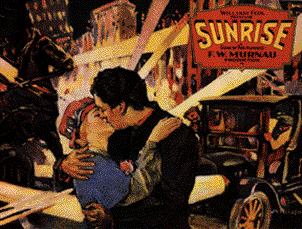
Winner of the 1927/28 award for Best Unique and Artistic Picture (aka Best Artistic Quality of Production) -- a category that existed only in the first year of the Academy Awards
Read an overview on Turner Classic Movies' Website here.
Read about it on the Internet Movie Database here.
Read a review on the Greatest Films website here. (By far the most thoughtful discussion of these three.)
Also, looks like Netflix is finally set to get this movie, as it is planned for release on DVD this coming December. I watched it on my DVR recorded from TCM. The Netflix page is worth checking out. There are a number of thoughtful member reviews there - which is kind of interesting, since the DVD isn't even available through Netflix, so you get reviews from people who watched the film through other means and took the time to discuss it.
And as always, there is quite a bit of interest to be found on Wikipedia, including interesting stuff about director F.W. Murnau and the cast.
There is one word that kept coming to mind as I did my preliminary research on and then subsequently watched this silent film: allegorical. The word sprang to mind even before I eventually found it spelled out in review form. The plot, the actions of the characters -- all seemed to be not realistic, but rather physical embodiment and portrayal of inner passions, desires, and struggles that might occur in any marriage. Well, hell, what do I know? Maybe other people in other relationships go out on rowboats with their spouses, are nearly killed by those spouses, flee to the big city, and then are persuaded that the spouse didn't really mean it by a big plateful of cakes, a lovely bouquet, and watching a brief marriage ceremony. When viewed literally, the events in the film seem almost ridiculous -- and I've read arguments from viewers who felt that taking the stance that the happenings in the film are unrealistic is to look at the film through a modern eye and to fail to place the film within its context as one should do. Well, to that stance, I answer with a single word that is also outmoded to the modern ear: poppycock. C'mon people, the film was made in 1927, not the middle ages. This was no more normal behavior then than it would be now. To me, the actions of the characters in the film only make sense when the whole is viewed as a parable. This is a "modern" day film-version of the old school Medieval morality play. The players embody the eternal struggle between good and evil in a way that might seem caricature if you encountered it in everyday life -- that's true now, and it was just as true in 1927. The protagonist must navigate these forces of good and evil, his devotion to his wife and baby versus the allure of the evil temptress, a struggle that becomes extended into the exterior world, as he battles against the forces of nature that threaten to drown him and his wife. The man's inner conflict is resolved, only then to be externalized and replayed by forces of nature in the form of a sudden storm, a capsized boat, and a desperate search for a wife suddenly lost.
I've seen the film called "fable-like" in a couple of places, and not to split literary hairs too much, but it's technically more of a parable than a fable -- no talking animals here! The film feels like it has been made with such intention -- it has the feel of someone consciously creating art, making choices about how to transform a literary work onto the screen in a way that retains the feel of a literary work. It is not intended to be a realistic representation of life, but rather a representation of the passions and emotions that fuel everyday life. I've studied German Expressionist cinema only a tiny bit, back in my Germanic Languages and Literature days (undergrad degree and then some graduate school). This film was certainly born of a great time in German cinema, and this could probably be called its introduction to American film. (As a sidebar, I was thinking about it, and I have had a hard time coming up with too many more current films that capture some of these literary, allegorical qualities. There are some, but it's not a mode that filmmakers very often successfully attempt -- perhaps Baz Luhrmann's version of Romeo and Juliet and the Coen Brothers' Oh Brother, Where Art Thou? come readily to mind, but there weren't many others that did.)
Immediately from the opening scenes, I really loved this film. It is visually arresting, and each scene continues to hold your interest throughout. The musical score is perfectly done, and the way that the music conveys the mood and plot and really almost serves as another invisible character -- seldom have I seen that done anywhere near as well. In modern film perhaps Brokeback Mountain comes close, but even it doesn't go quite so far as this, though music is so important throughout in both films. The integration of music and sound effects with the otherwise silent scenes of Sunrise conveys as much as, if not more, information and emotion than dialogue could. F. W. Murnau was such a filmmaking genius - his films leave such a strong mental trace for me. Watching this film brought immediately to mind the scenes and feel of another of his great films, the German film Nosferatu, one which I'd seen but largely forgotten until I watched this movie. For those who are not fans of silent films, especially because of all the reading, these films might be a great way to tap into the genre -- there are few things to read, few of those stereotypical placards between shots -- this is truly showing and not telling, sort of opera without the words, or a painting turned into a moving picture, or a relative of the way that ballet tells a story with nothing more than visuals and music. To read that Murnau studied art history and literature in his time at University comes as no surprise at all to someone watching this movie. Don't go looking here for realism, because it's symbolism that you'll find, and for some of the negative reviews I found on the Internet, it was quite clear to me that some of those reviewers were trying to interpret symbolism as realism, finding it ridiculous, and missing the point entirely. One person on IMDB wrote something along the lines of, "I can't help but wonder if it was such a good idea for The Woman to stay together with The Man, who clearly has murderous impulses up through the end -- it seems that Murnau may intend something much darker than the happy ending." (I'm paraphrasing the quote, so I probably don't have it exactly right.) Well, of course if this were real life, the woman shouldn't stay with a man with such murderous impulses always so near the surface. But these murderous impulses are intended to be symbolism of the dark and light impulses within us all, made external for the purposes of this film. It's not meant to be taken so literally, and doing so puts a twist on it that I don't believe Murnau intended. I suppose I return again to the morality play analogy -- the bigger message that comes through from all this symbolism is that The Man, having been faced with both good and evil, has worked his way through these challenges and chooses good in the end. One can struggle against dark inner impulses and emerge on the right side in the end. The psychological implications of a woman who chooses to stay with a man who almost murdered her and almost murdered another woman would most certainly make for a very interesting film -- but they are not the point of this film.
I am SO GLAD I discovered that this was also one of the Best Pictures in Academy Award history. If I'd only ever watched Wings, I think I would really have missed out. On the whole, if forced to choose one of the two, I'd pick this one as my favorite. It really does have amazing artistic quality. Even the little bits of comic relief were still funny, and at a couple points, I laughed out loud.
On a very shallow side note, I couldn't help but wish that Janet Gaynor hadn't had such a distractingly bad wig on, since it really just looked like some sort of a strange hat the entire time, but really, that's a pretty minor complaint that I can't say took away at all from my viewing experience. It's really just an aside.
All in all, I think this is a truly great film, and definitely worth tracking down. One of Murnau's films has been lost entirely, which is such a tragedy, but highlighted even more for me how glad I am that I was able to see this one.




No comments:
Post a Comment